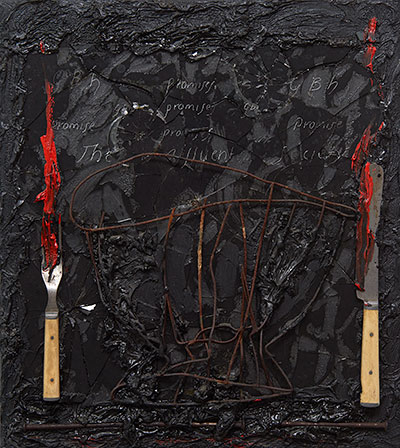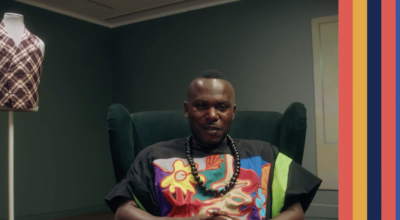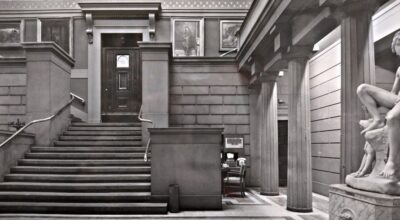Derek Jarman index
Interview: Jon Savage
Transcript: Marc Issue Robinson
I’m dealing with the period from ’75 to ’77, so when did you notice that there was something different following on from your generation, from Andrew and Duggie…
I wasn’t a part of that generation, this is a mistake. I was more a part of the 60s generation with Hockney and Procktor, and that gang. It was coincidental that I got involved with Andrew. I was at college with Andrew’s brother Peter, I shared a studio with him. In ’69 Andrew came to London and eventually moved into my studio at Butler’s Wharf. ’74 he moved in there. The cross references were reinforced by that.
In what respects were that generation different?
They weren’t as successful. In a way they were victims of The Look, whereas the 60s generation created a Look. By that time dyeing one’s hair blond was pretty second-hand, after David had done it. One had missed out on the 60s in some ways, although I was slightly older and had revolved around it.
Were they style victims?
If you want me to be very rude, I never thought they were anything other than fun people to be with. There wasn’t anything there, with the exception of Andrew, who was an art eccentric. None of them were doing anything. The different with Patrick and David was that they were right in the middle of it all, with David Bailey doing the photography, the Stones and Arthur C. Clarke. This was parochial compared with that. These people were quick to establish themselves as artists, and whether they were any good is neither here nor there, but they were travelling round the world, in a completely different league.
So when did you notice something moving on from that, was it Jordan?
I drifted away from all that at the turn of the 70s, and Andrew and Duggie and all the gang showed up, who were really friends of Andrew’s. I first saw Jordan outside Victoria station in ’74 or ’75. I didn’t know who she was, she was just a very startling image, more than anything I’d ever seen. She was wearing white patent high heels and a very short miniskirt with a plastic, almost see-through front, and a t-shirt, and a bee-hivish hairstyle. Very blonde. I think it was Egyptian makeup at the time, and she looked stunning. I wasn’t in any way aware of punk at that stage. When we did Sebastiane in the autumn of ’75 she was down there, and she didn’t make the differentiation between generations that the musicians or Malcolm or Vivien did. Malcolm was Fagin, always the con man of the first order. He would be out with the people, and then denouncing them for fun in the press, and no-one really cared. I don’t think anyone felt it was personal, they realised it was part of the ploy. So Andrew was quite happy to have the Sex Pistols there later that year, rehearsing upstairs.
So he had them in rehearsing before they did the concert?
I can’t really remember now, but I think I filmed the super 8 which went into the Swindle, I gave them later. But the genesis of Jubilee was originally a super 8 film with Jordan, it wasn’t anything to do with punk in that sense. It was to do with Jordan and whatever she wanted to make, but it grew in the course of early ’77, while we were writing it, and it was Jordan who brought in the punk element, because we wanted musicians involved. I had started collecting fanzines and things, people had started selling them down at the corner of the Kings Road in the market there, and that excited me, and it got amalgamated with writing the script. Jordan specifically brought in Adam, who she was working with.
What could be seen as a rift between two generations, didn’t occur with Jordan. I don’t think she felt it. There was a continuity. You couldn’t actually like someone like Andrew, so the interesting thing was, Johnny would be very rude to me when I went out, or Vivien would make a t-shirt, but it was almost a compliment, I was down there to buy it. It was differentiation in the market place. Ray Mouse and people like that dyed their hair, and it was only a small step onwards. The new element was Jordan’s interest in bondage gear, and fetishism.
Did you ever see the Sex Pistols play?
Only once, at Andrew’s studio. I remember Jordan coming to ask me to bring my camera up, cos the band was playing. I didn’t know who they were at that stage, I don’t think any of us did. I went up and they were on the stage Andrew had constructed for Sebastiane, so it had all the marble up, and all the remains of the Sebastiane set. Obviously I can’t remember what they were singing because it was all completely new, and it was a high energy racket. There were about ten or fifteen people there, and Jordan and Vivien in the front row were egging them on and gobbing at them and pretending to have battles with them, and Johnny turning his back and singing mostly to the wall, rather than to us. I remember having to be careful with the camera even with that small number of people there, cos it was all over the place. Jordan was rushing around wrestling with people. It all happened late one afternoon. Everyone came to Andrew’s new year parties, so it was never the break with that world that it seemed.
There was always great rivalry between the bands. As far as I was concerned, Jordan was the original. Everyone else in the fashion side follows on from Jordan, even Vivien and the shop, because without Jordan the shop wouldn’t have worked. She was the original Sex Pistol. Everyone else came in and saw Jordan dressed up, and the attitude, and it took off from there. She was the Godfather, the Godmother if you like. And yet she was the one out of all of them who never capitalised on her situation, really, she fulfilled the whole philosophy, of damn-you, and she let it die at the moment in her life when it was dead, and went back. She was the purest example of all. Her approach was very different, blatant sexuality. Chris always said she was like Queen Victoria, that she had the Windsor bosoms…!
Slowly but surely that group got to know that generation. There were crossovers, as you know. I clearly remember one evening at Luciana’s house with Sid Vicious and Johnny and Paul. Sid Vicious was monosyllabic, he didn’t talk to me, he spent his time scratching the floorboards with a knife. A very odd boy. But this all happens before they before they became the Sex Pistols. Paul was very quiet, but Johnny was very sociable, very clever and outgoing.
My connection with it all was very peripheral, but once Jubilee started it became less so, because it created a focus for about four or five weeks. Jordan actually helped and collaborated a lot with it, not just with bringing people along. I’d seen Adam on the street, and I mentioned I’d seen this lad with FUCK written on his back, which I thought was written on with eyeliner, but Jordan told me she’d actually carved it in with a razorblade. So he came along, and Glen matlock was around, but didn’t get into it, and gradually one person introduced another. The banshees came along, and we did videos of all of these bands, and I don’t know where they all went. The video was lost years ago, presumably someone has it, somewhere. We filmed the Slits, the Banshees, Adam, Chelsea and Wayne County. I knew Gene already, cos he’d been around the gay clubs for years, and he transformed, he’d always wanted to do something, and he felt he could fit in here. I don’t think the others would think of him as an originator, they thought of him as a bandwagon jumper. In a certain way, everyone does that.
I think there was some homophobia with Gene.
The music wasn’t great, but there was some homophobia there. There was homophobia running through the whole thing really, Vivien’s t-shirt about me, which was pretty extraordinary, it was the only thing that upset me about it.
Particularly after they had been exploiting homosexual fashions at one point.
I never really got to know Vivien, though I got to know everyone who worked in her shop.
Do you think the homophobia was running right through?
Well, not amongst the people I was working with, at all. But it was something they could utilise; at that point it would have been unfashionable, like putting swastikas around. The main drift of that time was gay liberation, it was a very different climate to now, and it was an anti-liberal thing then. Then there were the connections with dada, in the typography, and Jamie, and Jubilee came along and I attempted to make an analysis of it, really. Everyone was summed up in Jubilee; the moguls really were still in control and it was never really going to upset anyone, and people who thought it would were under an illusion. The other problem about such a revolution is that its very difficult to carry it through with such negativity. The predominant, and in order to carry out a revolution people have to agree yes about something. There wasn’t that spine there, so it was an art movement, relating to other art movements of the century, finding its sources in dada and things like that, visually in any case.
You obviously seemed to be saying that punk was all about England. You made a film about England. Why did you think that?
I just liked the energy of the whole thing, and whether the energy was misdirected wasn’t worrying me. It was suddenly being critical about things that everyone was being critical about. But when Johnny got up and sang God Save The Queen, that conversation could go on at any bourgeois dinner party, let’s face it. The same sentiment, but here was someone singing it, up front. It was funny to see those people scandalised. That was where I parted company with a lot of my friends who thought they were completely mad, and tasteless and ridiculous. I just felt that a lot of those people actually think the same way as these punks, underneath, but are not voicing it in any way.
Obviously there has been some sort of protest running through my whole life, against my bourgeois background, against the way homosexuals are treated, and so forth, and seeing people protesting about these things, one felt… kinship. On the other hand, I could see that some of the things they said they were doing, they certainly weren’t. I mean, the destruction of a record company is very minor. Had they even managed to physically destroy EMI, it wouldn’t have made any difference to the world whatsoever, because EMI is of no consequence compared with the KGB or the CIA. It was a storm in a teacup. On the other hand, they were the nearest enemy to hand. I don’t know how they would have dealt with the KGB…
You have to have that ridiculous sense of possibility, otherwise nobody does anything.
It livened everything up every day, apart from anything else. There were mad stories in the press every day, and it was fun to see that. The boat trip down the Thames, things like this. It was the last time that youth seemed to get it right, wherever they were going to end up, it seemed that everyone should at some point in their life, go through this disenchantment with what is received.
Did you feel that it was specifically English?
Oh yes, all those Union jacks and things. It was worrying in that sense, because dada leads to Weimar, and that sort of anarchy, which leads to the repression – and I put this into Jubilee, because I thought it was rather unfocussed, it was a lot of understandable and very correct disgust with everything around, but it isn’t focused, and in its own funny way, it did end in repression with Margaret Thatcher’s England. Jubilee told that parable and at the time it was complete fantasy, based on supposition, and in time it came true. Indeed, everyone had signed up, particularly the next generation like Adam, who became an old fashioned pop star. They all signed up in one way or another, so Adam’s role in that film becomes quite poignant in an odd sort of way…
That laugh he gives on the rooftop is very sad…
That was Adam’s reaction to my very pedantic and perhaps rather ridiculous writing. He was genuinely laughing at the thing, it wasn’t directed. He made the whole thing a joke, and react that way to what I thought was something, maybe a truism about the concrete towers and things. But afterwards I think people did become more aware of the trap in the concrete tower blocks then, but later it became a central issue, they started to blow them up. Odd things come true from Jubilee, like the church becoming the nightclub, which was the Limelight.
So it was a prophetic time, a time of heightened sensibilities?
I think Jubilee set out to be prophetic in its own way, to take that course, which was at odds with Vivien and her side of punk, who were being very down to earth about everyday things, whereas I was intellectualising and moving it into another area. After all, I didn’t have the sexual or economic problems of being eighteen or nineteen. Would those sexual and economic problems have been different from any other time? No, they’re the same problems but they change their form, and either it tries to collaborate in order to get itself out of the situation, as it seems to be doing now, or goes into revolt, and punk was the last time they did. The alternatives sweep backwards and forwards in a strange way, the next generation went out of their way to join Mrs Thatcher’s economics.
Did you see English archetypes in punk?
There was a lot of pantomime, with Jordan, which has been a very important element in english art.
What about Dickens?
I think the Dickens was slightly invented, by Malcolm, for the Rock ‘n’ Roll Swindle. They started to pirate the past in the way the 60s had before. With the 60s they went off and bought 20s clothes, Vivien started to re-invent pirates. It was very similar, a strong continuity. It wasn’t in any sense a specific break. That recycling of the past had already begun in the 60s with the Aubrey Beardsley stuff. There was nothing new, doing pirates, but one interesting area was the concentration on polymorphous perversity, the sexuality of the clothes. I don’t think that had happened before. You could buy those things in sex shops but people didn’t wear them on the streets.
You think that’s what caused the reaction, that it touched a raw nerve in England?
Yes, I think that’s where the raw nerve was. Sex really gets the english going, and you couple it with people in bondage gear, singing about the royal family and you’ve got it, haven’t you? The royal family is a great symbol of bondage, because they are completely trapped. You cannot think of any individuals who are more in bondage to the past. All those straps and chains are symbolic, and it’s all very interesting.
A lot of the lyrics in punk are trying to get to the unconscious…
Oh yes, if art is important, then punk is important. I see punk as art, as simply as that. It was socially engaged, and very naive sometimes, but deliberately so. I can’t believe that the people who wrote the fanzines weren’t deliberately misspelling – they were intelligent people who were doing this. It was like Edward Lear, in a sense. I saw a continuity in it, and it was very exciting, but I wasn’t eighteen, so I didn’t go out to punk venues, I would have been completely out of place in them.
Do you think the England of the time was decaying?
Yes, obviously decaying, and it still is, although we’ve cosmeticised it now. The whole docklands region was derelict… It’s hard to remember how you really felt when these people were just the boy you saw walking down the street, like Adam. I thought he had a good face, so we put him in as a sort of hero figure. A lot of the people became household names, for a little while. Anyone looking at Jubilee now would probably think I got the Famous Adam Ant, and the Famous Toyah, so oddly enough, Jubilee now has a cast.
You were setting Jordan up as a Queen Victoria figure?
That was just a remark on her looks that came from Christopher – she was like an english matriarch, but very charming. I got on with her. It was a performance. She’d leave all that behind when she came to see me.
What did she do in Sebastiane?
She was in the first scene, in all her gear, the court scene. I didn’t get her to change for it. I know it was supposed to be Rome, but Rome was supposed to be like modern London in its own way. They were all playing themselves. All the original dialogue was like modern chit-chat – “God, London was so boring, I’m glad to be back in Rome” – the word ‘boring’ was in the original script. That was in ’75. Pretty vacant, and all of that.
[ends]





